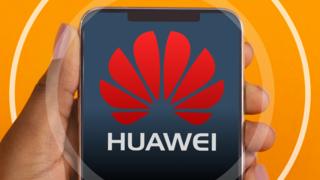Huawei: Why the UK might hang up on 5G and broadband kit supplier
 Image copyright Getty Images
Image copyright Getty Images These are tense times for Huawei and the UK’s telecoms providers.
The prime minister will shortly review use of the Chinese company’s equipment, with MPs set to be informed of his decision on Tuesday.
It seems likely that Boris Johnson will set a deadline by which time the firm should stop being involved in the country’s 5G network. But what’s unclear is whether he’ll also order it to be stripped out of other mobile and fixed-line broadband systems too.
The decision will not only have an impact on the rollout of high-speed data services but could also encourage other countries to rethink their own relationships with Huawei.
What are the options?
In January, the government ordered that Huawei’s market share of 5G and fibre-to-the-premises (FTTP) broadband be capped at 35%, and that it also be removed from the most sensitive part of mobile networks, known as the core.
Since then ministers have said that «over time» they want high-risk vendors – including Huawei – to be excluded outright, but have not said by when.
Some of the UK’s mobile networks have already spent large sums installing Huawei masts and other equipment to connect smartphones to their 5G networks.
They have said they want about seven years to replace it with another option if they must, and at a push could do it in five.
But some Tory MPs say the deed must be done before 2024’s general election.
The networks claim this would be difficult, not least because today’s 5G base stations are often upgrades of existing 4G kit. So the swap to another supplier is a bigger job than it might seem as it involves replacing much of their 4G infrastructure too.
In regard to broadband, BT’s Openreach division will bear the brunt of any decision.
It currently aims to meet the cap by using two other vendors to build new FTTP capacity rather than by replacing any existing Huawei equipment, which would involve extra cost and effort.
And then there’s the nuclear option.
If Mr Johnson wants Huawei out of the telecoms network altogether, then 70,000 roadside cabinets used to provide existing broadband connections would also need to be refitted.
At that point, the sums and work involved start to become colossal.
Why is this happening?
Geopolitical tension between the US and China is the reason behind the review into the use of Huawei’s technology.
Washington claims Huawei poses a national security risk and has unfairly benefited from government support. Whether these claims are true – and Huawei denies them – the Trump administration clearly sees the company as a totem for the spread of Chinese influence, and is trying to push back.
Its latest move is sanctions designed to prevent the firm from being able to get its own chips manufactured.
Neither Huawei nor the third-party fabricators it relies on would be allowed to use American electronic design automation (EDA) software – which is used to design, simulate and produce the firm’s processors – or any other tool based on American intellectual property,
At present there is no quick way to get round this, leading one of the world’s biggest chip producers – TSMC – to stop taking new orders from the Chinese company.
With enough time, Huawei might convince manufacturers to run «de-Americanised» production lines.
But in some cases there are no easy substitutes. In particular, it would lose the ability to make chips as densely packed with transistors as is currently the case, meaning they would not work as efficiently.
As a result, Huawei may have to let others design and make the chips at the heart of its products.
However, UK security chiefs are concerned that this would prevent them being able to vet it equipment as thoroughly.
And it is believed GCHQ’s National Cyber Security Centre has told politicians the balance of risk has shifted as a consequence.
One option that had been considered was for the government to advise – but not order – networks to stop using Huawei’s kit.
But dozens of Tory MPs have made clear they would rebel unless a tougher line is taken.
Bob Seely – a member of the Huawei Interest Group of Conservative MPs – told the BBC he believes the government will announce that no new 5G Huawei kit can be installed after 2021, and all such equipment must be removed by the end of 2025.
«Not everyone would be satisfied by that,» he said, but added that it would be enough to prevent the government losing a parliamentary vote.
What can Huawei do?
For now, the firm seems to be hoping it can sway the prime minister’s mind at the eleventh hour.
Huawei can make the case that it has built up stockpiles of its chips and the sanctions allow foundries outside the US to continue making more until mid-September.
Moreover, it could promise to set aside some of that supply specifically to fulfil UK orders, and thus guarantee that it would not need to ship kit using third-party components to the country for at least two or three years – by which point the US sanctions might be over.
That might satisfy immediate security concerns, but the decision is also a political one.
Huawei hopes any new restrictions are accompanied by a pledge to carry out a follow-up review, leaving the door open to a further U-turn.
But in the light of tensions with China over its treatment of Hong Kong, Boris Johnson might not be in any mind to offer such a concession.
Huawei could still try to mount a legal challenge.
When asked about this possibility, its UK chief Victor Zhang said now was «not the right time to make the case» .
What would be the consequences for the UK?
Ericsson already supplies many of the UK networks with 5G kit and has said it can take on extra demand at a competitive price.
«Commercially, will it cost more? I can guarantee you no,» the firm’s European chief Arun Bansal told the BBC.
Nokia is another existing supplier that could pick up the slack. And – in time – there’s also talk of bringing Samsung and NEC on board too.
But Vodafone has warned that unless operators are given at least seven years to pull Huawei out, then the further rollout of 5G will be slower than planned.
Likewise, Openreach believes it would struggle to meet the prime minister’s 2025 target of «gigabit broadband for all» if it has to replace existing Huawei broadband gear.
There would also be wider ramifications.
Huawei would presumably rethink promises it has made to invest in R&D in the country, including plans for a £1bn development near Cambridge.
Furthermore, China’s ambassador to the UK has said it would damage Britain’s reputation for being a business-friendly, open nation.
«When you get rid of Huawei, it sends it a very wrong message. You punish your image as a country that can conduct independent policy,» said Liu Xiaoming.
On the flipside, a ban might encourage the Trump administration to give the UK a free trade deal that would aid its post-Brexit fortunes.

